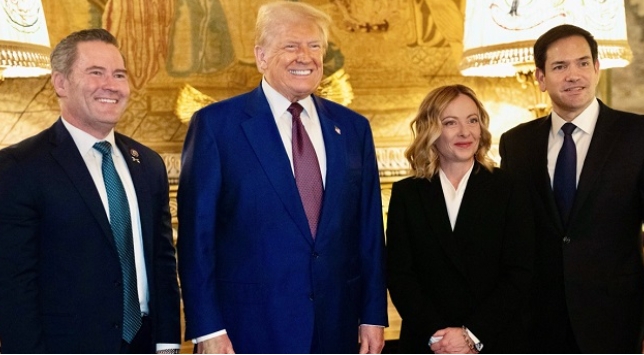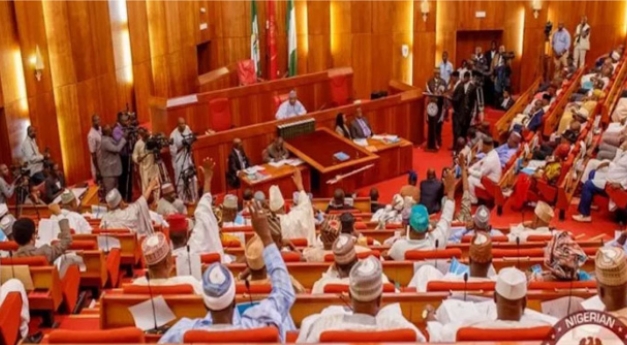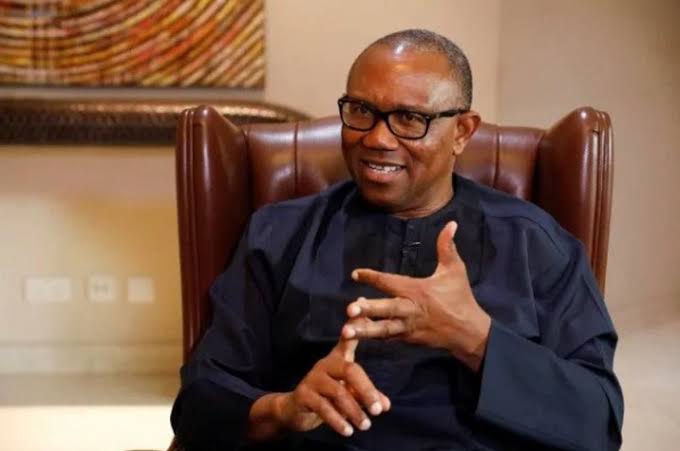News
Diversification from oil, an urgent economic necessity – Speaker Abbas

News
US Congress Certifies Trump Win Four Years After Capitol Riot

By Kayode Sanni-Arewa
Donald Trump capped a historic political comeback on Monday as Congress certified his election victory, in a remarkable turn from four years ago, when a mob he had summoned to Washington ransacked the US Capitol.
The president-elect spent much of his campaign facing prosecution over the 2021 insurrection, when his supporters — fueled by his false claims of voter fraud — rioted to halt the certification of his defeat to Joe Biden
But Trump, 78, was voted back into office in November and Monday’s ceremony went much more smoothly, even with a major winter storm blanketing the capital and much of the country in snow.
“Donald J Trump of the state of Florida, has received 312 votes. Kamala D Harris of the state of California has received 226 votes,” Harris herself declared to assembled lawmakers after the counting was complete.
Harris — who oversaw the certification as part of her vice-presidential duties — said the official count “shall be deemed a sufficient declaration” for Trump and Vice President-elect JD Vance to take their oaths of office on January 20.
The ceremony marked the final blow to efforts to have the Republican leader face justice over the riot, the culmination of a multi-pronged alleged criminal conspiracy that prosecutors said Trump led — before they dropped all charges upon his election.
Trump has vowed to pardon an unspecified number of the rioters — around 900 of whom have admitted federal charges from trespassing and vandalism to assaulting police — describing them as “hostages.”
In a Washington Post op-ed, Biden slammed Trump’s allies for downplaying the violence of 2021 and urged Americans to be “proud that our democracy withstood this assault.”
“We cannot accept a repeat of what occurred four years ago,” he said. “An unrelenting effort has been underway to rewrite — even erase — the history of that day.”
Indiana conservative Mike Pence had Harris’s job — certifying his own defeat alongside Trump — in 2021 when, in a desperate bid to cling to power, the then-president demanded that he reject Biden’s victory.
Lawmakers in both parties have occasionally used the certification process to challenge elections, but more than half of House Republicans rejected the results in 2021.
– ‘Emotional trauma’
No Democratic leaders followed the Republican example this time around and there were no objections to certifying Trump’s victory — a process that took barely half an hour.
The former reality TV star was impeached for inciting the 2021 insurrection after delivering a raucous speech outside the White House early in the day, demanding that supporters march on the Capitol and “fight like hell.”
Thousands attacked the citadel of American democracy — battering police with metal bars and flag poles, smashing windows, sending lawmakers running in fear and chanting “Hang Mike Pence!”
Four people died — two from heart attacks, one from a potential overdose, and a rioter fatally shot by police as she tried to force her way into the House chamber. Four police officers committed suicide subsequently.
Republican Speaker Mike Johnson has vowed to investigate the House committee that probed the riot and found that Trump had instigated it after the failure of a host of other schemes to overturn an election he knew he had lost.
US Attorney General Merrick Garland said in a statement the Justice Department had over the last four years charged more than 1,500 people suspected of involvement in the “unprecedented attack on a cornerstone of our system of government.”
The certification — which launches a two-week countdown towards Trump’s January 20 inauguration — was designated for the first time as a national security special event, with 500 National Guard personnel on standby.
But the federal government and Washington public schools were closed Monday with up to a foot (30 centimeters) of snow expected.
“Four years ago today, our nation watched in horror as a terrorist mob stormed the Capitol grounds and desecrated our temple of Democracy in a violent attempt to subvert the peaceful transfer of power,” Democrat Nancy Pelosi, who was House speaker at the time of the rebellion, said in a statement.
“The January 6th insurrection shook our Republic to its core — and left behind physical scars and emotional trauma on members of our congressional community and our country that endure to this day.”
AFP
News
Senate Sets Jan 31 For Passage of N49.7trn 2025 Budget

By Kayode Sanni-Arewa
The Chairman of the Senate Committee on Appropriations, Adeola Olamilekan, has affirmed January 31, 2025, as a provisional date for the passage of the 2025 ₦49.7tn budget as the committee prepares to begin budget defence on Tuesday.
He made this disclosure on Monday during a meeting with the chairmen of relevant committees on the template for the 2025 Budget Defence Session to guide the budget process towards its eventual signing into law.
Olamilekan further revealed that upon the resumption of plenary by the 14th of January 2025, the Senate would immediately commence a two-week break for the seamless continuation of the budget defence process.
He equally revealed a planned retreat on Thursday on the budget consideration which will involve ministries, departments and agencies, civil society organisations, and other stakeholders in the polity for further consultation and insight into the content of the budget proposal
According to the timetable, from the 15th to the 18th of January, it is expected that the committees would report back on their documents, after which collation and tiding of documents by the Appropriation Committee.
Acknowledging the limited timeframe, Olamilekan emphasised the need for lawmakers to intensify their efforts. He also urged his colleagues to forgo their holidays and begin immediate work on the proposed budget estimate, underscoring the importance of timely and efficient handling of the budget process within the stipulated timeframe.
News
My life now under heavy threat after my new year message – Obi alleges

By Kayode Sanni-Arewa
The Labour Party (LP) presidential candidate in the 2023 elections, Peter Obi, has alleged threat to his life following his criticism of President Bola Tinubu’s administration in his new year message.
Obi’s allegation follows a statement credited to the national spokesperson of the All Progressives Congress (APC), Felix Morka, in a recent interview.
Morka was quoted to have said that “Peter Obi has crossed the line so many times and has it coming to him whatever he gets”.
In his new year press conference on Thursday, Obi had lamented the political, economic and security, healthcare situation in the country.
The former Anambra State governor said that the political, economic and security situation of Nigeria is worsening daily, despite government’s contrary positions and claims of improvement in different spheres of human endeavour.
“Our national challenges are visibly worsening. Our nation and its fortunes are in clear reverse. The indices are clearly indicative of our decline; thus our national indices tell a disconcerting story,” Obi said.
“Nigeria remains one of the poverty capitals of the world, with over 100 million people living in extreme poverty and more than 150 million in multidimensional poverty. The situation has deteriorated significantly over the past 18 months under the current administration.
“As a nation, we have fallen from being the largest economy in Africa, with a GDP of $574 billion and a per capita income of over $3,500 in 2014, to now ranking fourth on the continent. Our current GDP is less than 50% of what it was a decade ago, standing at approximately $200 billion, with a per capita income of barely $1,000.”
Reacting to Morka’s statement in a post on his X handle on Monday, Obi asked if he has “really crossed the line” after receiving threats against his life, family, and associates following his New Year’s message.
He challenged anyone who thinks he has crossed the line to point it out to him where he did, expressing his commitment to upholding decorum.
The former governor also vowed not to be silenced in his resolve to speak truthfully, especially as the country “drift toward undemocratic practices.”
His post reads, “I ask the question because my New Year message has now led to threats against my life, my family, and those around me. While I have received all sorts of messages, one Mr. Felix Morka has gone further to accuse me of “crossing the line” and has warned that I will face the consequences.
“If I have truly crossed the line, I invite anyone to point it out, as I remain committed to upholding decorum. However, I will not be silenced in my resolve to speak truthfully, especially as our nation continues to drift toward undemocratic practices.
“We are increasingly transforming into an authoritarian and repressive regime, where freedom of expression is being systematically suppressed. May God help us create a better and freer society for the sake of our children.”
-

 Foreign23 hours ago
Foreign23 hours agoKemi Badenoch calls for fresh probe into ‘rape gangs scandal’ in UK
-

 Foreign23 hours ago
Foreign23 hours ago3 killed after Coast Guard helicopter crashes
-

 Entertainment22 hours ago
Entertainment22 hours agoUnveiling The Truth: Cubana Chief Priest Clarifies Viral Gift Saga
-

 Health23 hours ago
Health23 hours ago10 Things to Know About Asthma and How to Live Better with the Disease
-

 News22 hours ago
News22 hours agoBiafra: Simon Ekpa Remains in Custody as Finnish Authorities Release Two Accomplices
-

 Foreign22 hours ago
Foreign22 hours agoRwanda-backed rebels seize towns in Congo
-

 Sports22 hours ago
Sports22 hours agoManchester United Firm As Liverpool Miss Golden Opportunity
-

 Metro22 hours ago
Metro22 hours agoSeven injured as three-storey building collapses in Rivers


















